Contract Farming Project
CPF has been working closely with farmers in the “Contract Farming” scheme since 1975 with the aim to promote employment and ensure income generation among Thai farmers. The essence of the contract farming scheme is the guarantee for secured markets and the assurance that contract farms are operated under the same traceable standards as the Company own farms. This is to ultimately benefit the farmers by securing their income and to ensure our consumers of safe and high-quality food.
In 2015, the Company reviewed and improved the contract farming agreement for the benefits of the farmers, the Company and consumers in line with UNIDROIT principles of the International Institute for the Unification of Private Law, the No.1 independent intergovernmental organization. We were the first company in Thailand that adopted the international guideline in the scheme.
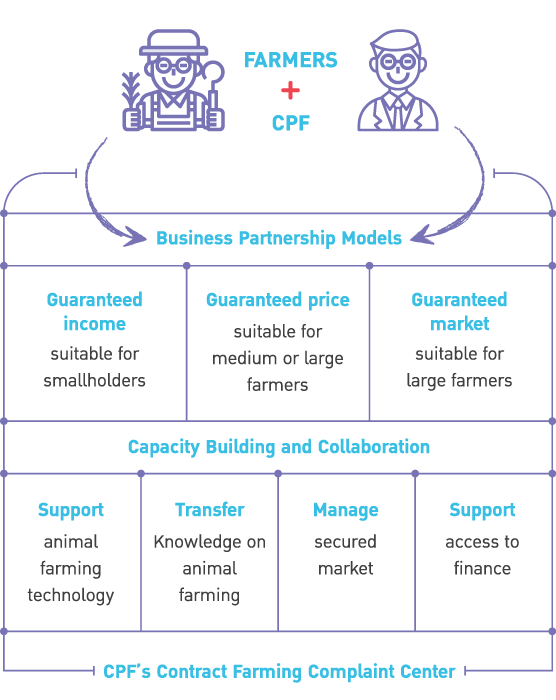
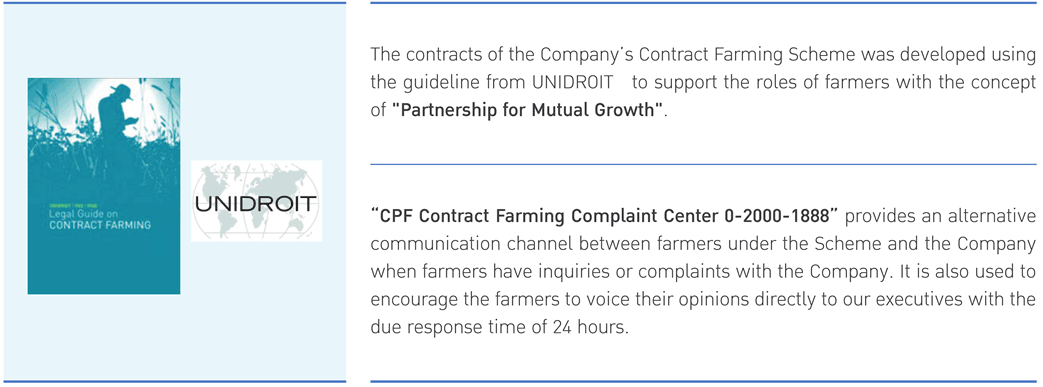
In accordance with the “Partnership towards Kitchen of the World” concept, the Company also places an emphasis on building farmers capacity on effective farm management, and socially and environmentally responsible business practices to create shared business success. To achieve this, we continue to organize a variety of group and one-on-one training programs for farmers. At present, there are approximately 5,000 contract farmers in our contract farming scheme for swine, broilers, layers and aquaculture.
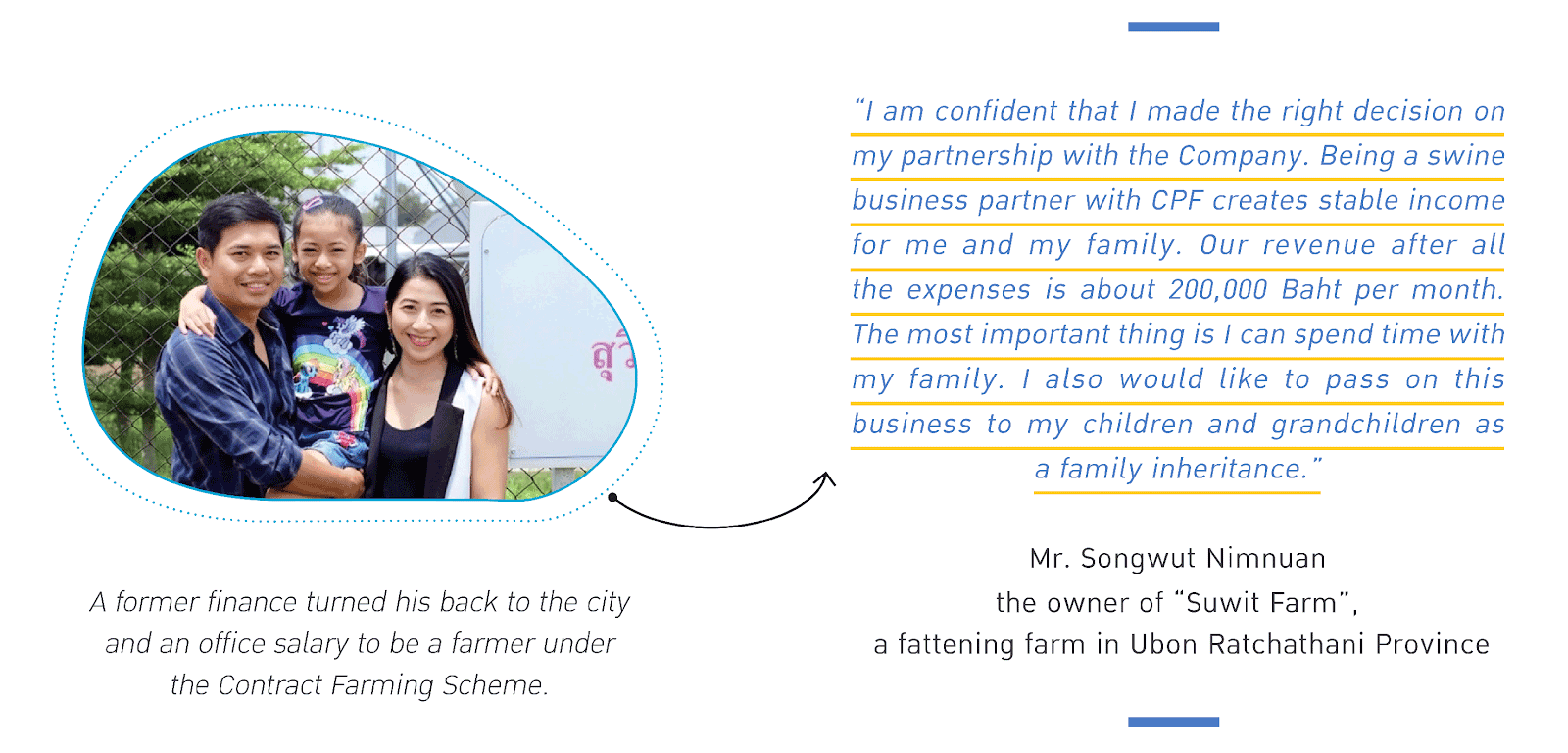
Agricultural Villages Project
Since 1977, CP Group and CPF have contributed to supporting smallholder farmers in securing farming profession through the promotion of farmer cooperation to increase management capacity. We adopted His Majesty the late King Bhumibol Adulyadej’s concept of integrated farming systems and utilized our competency together with the participation of the community. We help transfer knowledge and technology, especially on animal husbandry, to increase opportunity for employment, income generation and the development toward a self-sufficient society.
For more than 40 years, CP Group and CPF have collaborated with Thai farmers under the Nong Wah Agricultural Village Project at Phanom Sarakham District, Chachoengsao Province and the Kamphaengphet Agricultural Village Project at Muang District, Kamphaengphet Province. We have helped support employment prospect and strengthened the community, leading to secured employment, regular income, better quality of life and conservation of farming profession from generation to generation.
With the success in developing a model village for the sustainable integrated farming system at Nong Wah Agricultural Village and Kamphaengphet Agricultural Village, the Company later initiated the Kaset-Santirat Village Project at Phanat Nikhom District, Chonburi Province.
Nong Wah Agricultural Village…Model for Sustainable Integrated Farming
Following the footsteps of the late King Bhumibol in agricultural land reform, CP Group and CPF collected 1,253 rai of degraded land which could not be cultivated at Moo 3, Baan Song, Phanom Sarakham District, Chachoengsao Province and redistributed it into 24 rai per plot. Each plot was divided into 1 residential house and 1 swine housing and was given to 50 impoverished farmers who did not own any land.

‘Pracharat Community’…the Strong Foundation
To develop the economy on a strong foundation, the project operated with the collabourations from four parties:
To develop the economy on a strong foundation, the project operated with the collabourations from four parties:
Government:
Phanom Sarakham District Government developed basic infrastructure and selected farmers to participate in the project.
Community:
50 farmers who passed the selection process participated in the project from January-May 1978.
Financial Institution:
Bangkok Bank provided financial support in the form of loans for land purchase, housing, and construction of swine housing. The Bank also provided working capital for swine farming and planting.
Private Sector:
The Company, on behalf of CP Group, distributed land to farmers, provided knowledge on modern farming techniques and knowledge on accounting and financial management, and transferred technology on animal husbandry. We were also responsible for marketing and were the guarantor for all farmers.
From ‘Project’ to ‘Company’
Swine farming is the main business for farmers in Nong Wah Agricultural Village. The village is considered the biggest swine farming community in Thailand. They also have secondary jobs that is suitable for the environment and the community way of life. The secondary jobs include rubber plantation, mango plantation, native chicken farming, sweet bamboo growing, straw mushroom cultivation in closed systems, horse breeding and farming, and organic fertilizer pellet production. They have the management system that depends on knowledge sharing and participation, which helps strengthen the community and increase quality of life.
As farmers became self-reliant, they developed the “Nong Wah Agricultural Village Project” into “Nong Wah Agricultural Village Company Limited” in 1988. The company has two main objectives, namely to ensure business survival, and to increase income and quality of life of farmers. Every farming household is a shareholder of the company. They elected representative farmers to become the board members whose responsibility is to be the intermediary in collecting produce from members and selling it to business partners. The board is also responsible for sourcing factors of production from external parties and selling them to the members. This model has helped farmers learn more about marketing and business administration for agricultural products.
Secured and Sustainable Success
Key indicator for farmers’ success is income. From the previous 2,000 Baht per household per month of generated income, farmers now generate approximately 80,000-100,000 Baht per household per month.
Success is not only indicated by having a secured job and stable income, quality of life of farmers and their family is another good indicator for success. Being impoverished and having no land prior to our project, now farmers have land, assets and better quality of life. Their children have as high an educational opportunity as they wish. Farmers also adapted agricultural knowledge and local wisdom with technology to create innovation that enhance the quality of life and conserve the environment. These innovations include biogas production and organic fertilizer pellet production from swine manure.
The success from working diligently and in harmony is also passed on to their descendants as well as to children and youth, educational personnel and government agencies through a variety of activities including Open the World of Learning with the Nong Wah Agricultural Village project and farm stay at Nong Wah Agricultural Village. This has made the village the model community for farmers’ capacity building.
In addition, in remembrance of His Majesty the late King Bhumibol Adulyadej’s commitment to conserving and restoring forests coupled with our determination to raise awareness on conservation of soil, water, forest and biodiversity among the community, employees and farmers, CPF and the Nong Wah Agricultural Village collaboratively initiated the “Eco Forest Planting in the Community in remembrance of His Majesty the late King Bhumibol Adulyadej” project. More than 50,000 trees of 109 species were planted across the area of 14 rai. The planting was carried out to imitate the natural process so that the forest could become the learning center for sustainable eco forests.
Kamphaengphet Agricultural Village…Harmonized Village, Modern Technology
The Kamphaengphet Agricultural Village Project was initiated to enhance the quality of life of Thai farmers. Adopting His Majesty the late King Bhumibol Adulyadej’s thought on land reform, the project distributed more than 4,000 rai of land for modern integrated farming at Moo 20, Thep Nakhon Sub-district, Muang District, Kamphaengphet Province.
Four Collaborations and Land Management for Integrated Farming
The Kamphaengphet Agricultural Village also operated under the same four collaborations concept as Nong Wah Agricultural Village. The Muang District Office provided basic infrastructure, a total of 64 farming households were responsible for the production, Bangkok Bank provided financial loan, and CP Group together with the subsidiaries were responsible for project management. The land area was divided into two zones as followed:
- Zone 1: The zone covers 2,400 rai of land for central infrastructure including roads, an irrigation system, a field crop plantation and a demonstration plot which is now “Rice-Fish-Palm Modern Agriculture Learning Center”. The learning center provides opportunity for farmers, communities, educational institution, and other agencies to learn about agriculture free of charge. The management has been carried out by CP Group and Crop Integration Business of CP Group.
- Zone 2: The zone covers 1,600 rai of land initially distributed to 64 farming households. Each household were distributed 25 rai of land, of which 5 rai is used for housing, swine farms, fish ponds, and vegetable farms while the remaining 20 rai is used for crop plantation. The management has been carried out by CP Group and CPF.
Modern Integrated Farming Strengthening the Community
With the collaboration and strong commitment of CPF and farmers to using modern integrated farming knowledge, machinery innovation, and a comprehensive management system in the production process, farmers have become successful in their profession. They have stable income from swine farming which is their main profession, generating approximately 50,000 – 150,000 Baht per household per month and from their secondary job which includes catfish farming, water mimosa farming, vegetable farming and selling fertilizers from swine manure. This helps farmers generate more than 100,000 Baht per year.
In addition, the community also emphasizes environmental and water management through a variety of projects including:
- Kamphaengphet Agricultural Village Forest Park Project The project is on an area of 30 rai with more than 18,000 trees in 220 species planted to conserve native species and to create an ecosystem that can be home for a variety of plants and animals. The park also helps promote environmental education and becomes a learning center for the community, local educational institutes and those who are interested.
- Biogas Project Biogas from swine manure and wastewater is used to generate electricity for consumption in the Kamphaengphet Agricultural Village.

- Organic Fertilizer Project from swine manure scrap from Biogas Project to be used in oil palm plantation, in rubber plantation, in Kamphaengphet Agricultural Village Forest Park, and in improving soil condition in the area.
- Water Recycling Project utilizes treated water from Biogas Project to water trees in oil palm plantation, in rubber plantation, and in Kamphaengphet Agricultural Village Forest Park.
Today all farmers are self-reliant. Every family has good quality of life. The Village is in harmony and continues to develop following the Sufficiency Economy Philosophy with the aim for a secured and sustainable happiness and success.
Kaset-Santirat Village
Recognizing the importance of the police profession and the quality of life after retirement, in 2006 CP Group and CPF initiated the Kaset-Santirat Village Project at Moo 5 Na Wang Hin Sub-district, Phanat Nikhom District, Chonburi Province. We distributed more than 230 rai of land and supported knowledge and technology transfer on animal husbandry to 31 police officers and their family with the aim to help them generate alternative income and to give them the opportunity to be home-owners.
The Kaset-Santirat Village was made possible by the collaboration from four parties, namely the Royal Thai Police, TMB Bank, Ko Chan District Police Station in Chonburi Province and CP Group led by CPF. We used the “One Village Four Products” concept to promote income generation and to enhance the quality of life of police officers and their families.
-
Zone 1: The zone covers 50 rai of land used as residential areas. Each family was provided with 1.5 rai of land with a house and a native chicken coop.
-
Zone 2: The zone covers 180 rai of land used for agriculture including greenhouses for vegetable farms, swine farms equipped with biogas ponds and frog ponds.
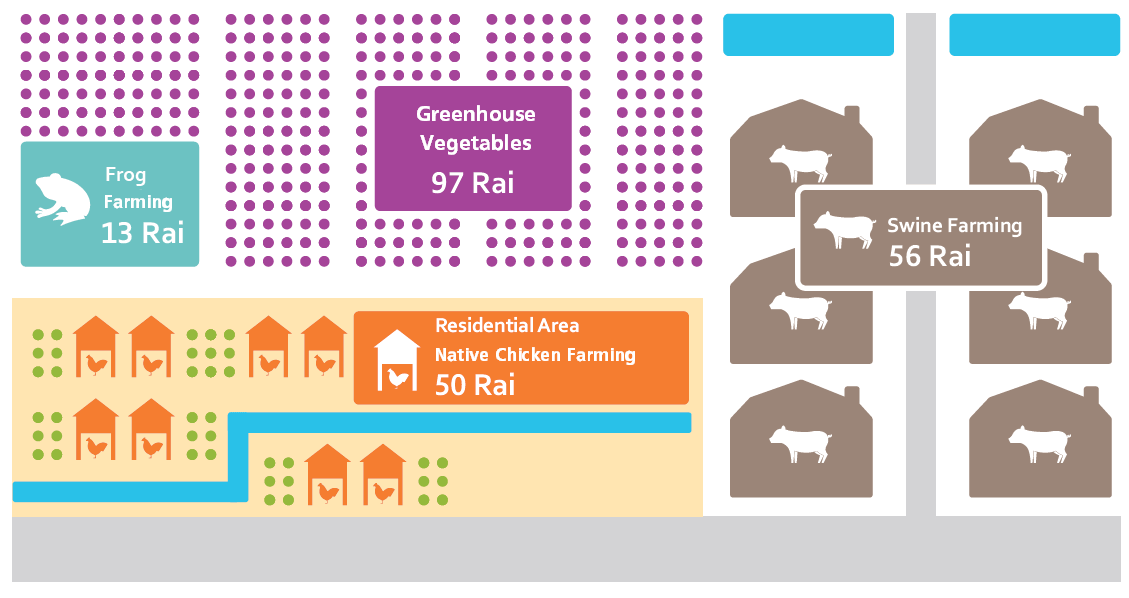
At present, the Kaset-Santirat Village has become “Kaset-Santirat Company Limited” with 31 police families as shareholders. In 2018, the land rights were completely transferred to the police officers.
Smallholder Farmers Support Project
For four decades, the Company has been working closely with the Rural Lives’ Rural Lives’ Development Foundation , under the support from CP Group and our employees as well as other partners, to promote the “3 Good Practices” concept which comprises “Good Person, Good Citizen, and Good Occupation.” This is in line with His Majesty the Late King Bhumibol Adulyadej’s initiatives on developing people and promoting local employment and income generation. In 2019, the Company and the Foundation supported more than 5,600 smallholder farmers and their families in having a secured profession and adequate income.
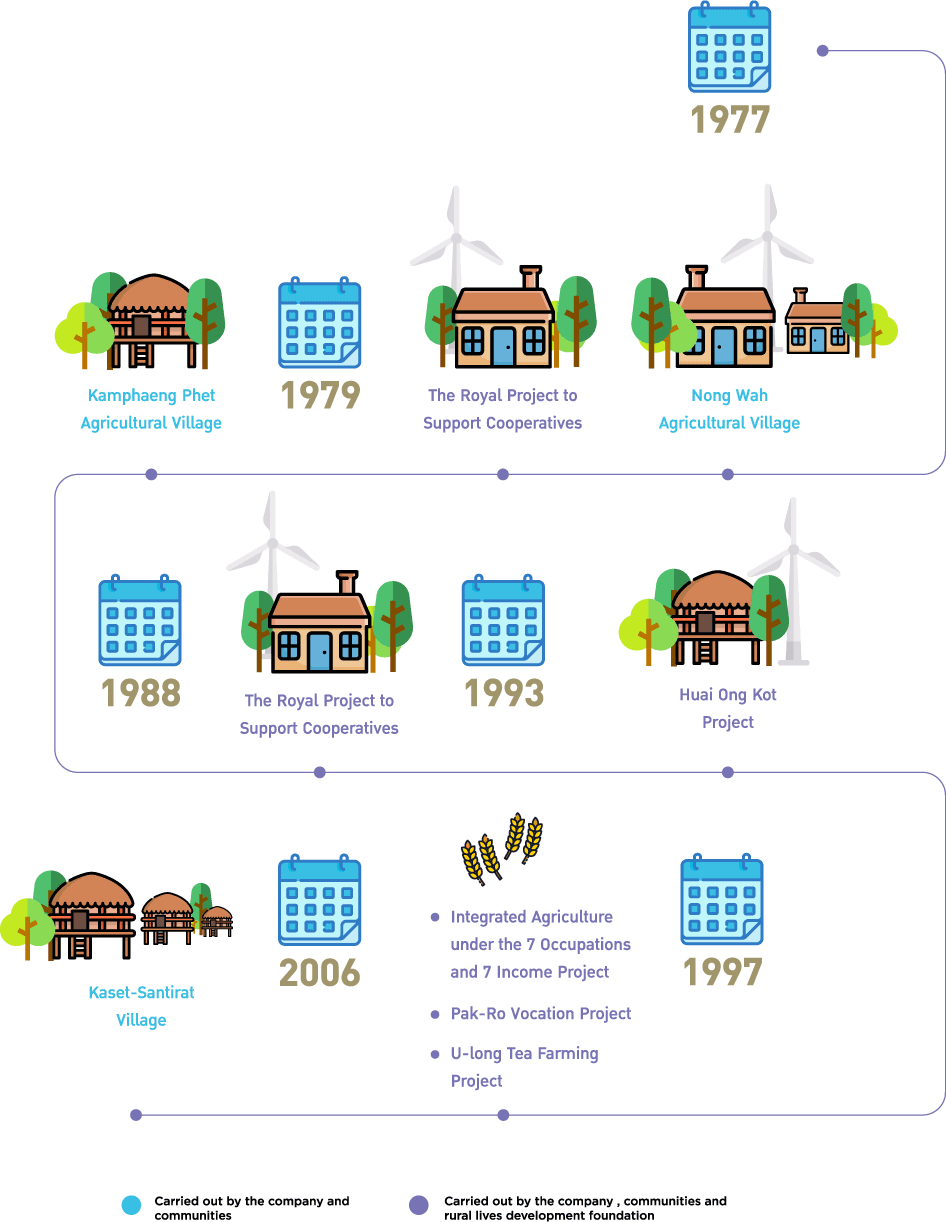
Cooperation of farmers not only helps facilitate farming management but also helps solve other problems in the community, the practice of which becomes a model for others.
Performance





